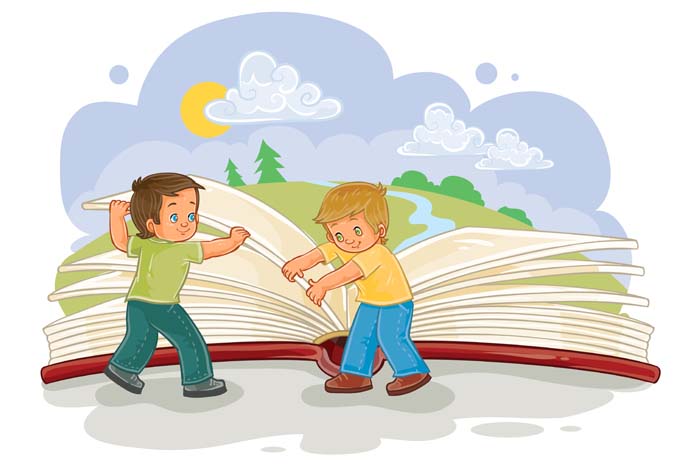The spotlight is on, and the stage is set! Picture the vibrant colours, the electrifying energy, and the mesmerising storytelling of traditional Indian plays like the Ramayana, Ramleela, and Nautanki. These timeless tales have captivated generations and continue to enthral audiences with their powerful performances. Now imagine bringing the magic of these dramas to life within the four walls of our classrooms! That’s right, we’re talking about the wonders of drama for students and its manifold benefits in education. The importance of drama cannot be emphasised enough, and that’s why we bring you the top 12 benefits of incorporating drama into education. So, grab some popcorn and get ready to enjoy the dramatic ride filled with skits for kids and the magic of the stage!
12 Wonderful Benefits of Drama for Your Kids
- Boosts Confidence
- Enhances Communication Skills
- Fosters Creativity
- Encourages Teamwork
- Develops empathy
- Enhances problem-solving skills
- Improves Concentration and Focus
- Builds Emotional Intelligence
- Stimulates Intellectual Growth
- Offers a Safe Environment to Explore Social Issues
- Enhances Cultural Awareness
- Provides a Platform for Self-expression
Drama activities are a wonderful way for students to explore their creativity and develop important life skills. Children are encouraged to move outside their comfort zones and express themselves freely without fear of being evaluated by others by engaging in skits and other dramatic activities.
These kinds of activities help children develop enhanced self-assurance and confidence in their abilities, which they can then apply to other aspects of their lives. They put on a successful performance with their peers while learning important collaboration and communication skills that will aid them in both their personal and professional lives.
Did you know the importance of drama in education?
Theater stretches the skills of imagination. Unlike the realism of television or movies, theatre requires a different kind of resourcefulness and flexibility. For example, in Disney’s Frozen, when Princess Anna freezes, the animation turns her to ice, literally. In the Broadway musical version, when Princess Anna freezes, an ensemble of actors dressed in white and silver create an undulating human bridge that latches on to Anna and “freezes” her in place. No surprise, studies show that engagement with drama leads to more creative thinking and originality.”
– Ruthie Fierber, writer at Parents
The importance of drama in education lies in its unparalleled ability to develop and enhance both verbal and non-verbal communication skills. Dramas and plays provide students with a comprehensive understanding of the crucial role played by body language, facial expressions, and gestures in effective communication. Learners can become more successful communicators and better equipped to manage a variety of social and professional situations by mastering the art of expression.
Drama for students is a fantastic medium for fostering creativity and imagination. Students learn the capacity to think creatively and come up with unique solutions to issues by participating in a range of roles and settings. Drama also fosters creativity which is a one of the key benefits of drama.
Working together to create a successful performance teaches students the value of collaboration and teamwork. They gain the ability to communicate effectively, share ideas, and respect one another’s viewpoints.
Drama activities offer students a unique opportunity to explore the world from different perspectives. Children can get a deeper grasp of a variety of emotions, experiences, and viewpoints by assuming the roles of various characters. As a result, children’s empathy and compassion can grow, leading them to become more insightful and kind people. Further, the importance of drama in education will be evident when children begin to be empathetic towards others.
Children gain an appreciation for the experiences and viewpoints of others through theatre exercises that teach them to view the world from various perspectives. They can obtain an understanding of the issues, pleasures, and tragedies faced by people of various backgrounds and civilizations by putting themselves in the shoes of a character who may be completely different from themselves.
Drama activities often require students to think on their feet and adapt to unforeseen challenges. As a result of learning how to handle challenging situations with composure and resourcefulness, they gain problem-solving skills. Therefore, developing problem-solving skills is one of the important benefits of drama for kids.
Did you know that drama can help build social skills and friendships in kids?
The process of learning lines, following cues, and staying in character demands immense concentration and focus. This helps students develop better attention spans and the ability to stay focused on tasks for longer periods.Therefore, the importance of skit can be evident in children’s lives when they begin to be more focused in their schoolwork and other activities.
The importance of skit in teaching students to recognize, understand, and manage their emotions cannot be overlooked. Students learn more about themselves and are better prepared to manage their emotions in real-life circumstances by investigating different emotional states.
Drama for students is an excellent platform for critical thinking and intellectual growth. Through analysing scripts, understanding character motivations, and exploring themes, students develop their cognitive abilities and analytical skills. Therefore, intellectual growth is one of the important benefits of drama for school students.
Drama in education provides a safe space for students to explore social issues and address sensitive topics that may be difficult to discuss in other settings. Through the power of storytelling, students can get insights into various viewpoints and cultivate a more open-minded vision of life. In this manner, drama for school students builds awareness on social issues.
One of the crucial roles of drama in education is to build cultural awareness. By exploring plays, stories, and characters from various cultures and backgrounds, students gain a deeper appreciation and understanding of diverse cultural perspectives. This helps them become more culturally sensitive and respectful individuals.
Last but not least, the importance of drama lies in its ability to provide a platform for students to express themselves freely. Students can release pent-up emotions, explore their identities, and find their distinctive voices by engaging in creative self-expression.
Conclusion
In conclusion, the benefits of drama in education are undeniable and far-reaching. The incorporation of drama for students not only adds an element of fun and excitement to the learning process but also helps in the child’s overall development. By participating in skits for kids and other drama-related activities, students can grow both personally and academically, acquiring valuable life skills that will stay with them long after they leave the stage. In this article, we have covered the role of drama in education and its benefits for your children.
It is absolutely essential that we, as educators and parents, understand the value of drama or plays in the academic setting and give our little ones ample opportunities to hone and polish their acting skills. After all, the stage is set, and the curtains are drawn; it’s time for our future stars to shine and take centre stage in their own learning journey. Let the magic of drama unfold and witness the transformation it brings to the lives of our young learners!
At EuroKids, we believe that children should indulge in extracurricular activities like drama and plays. EUNOIA, our special curriculum, keeps the innocent and beautiful mind of a child at the heart of everything we do. EUNOIA is a Greek word that means “the beautiful mind’ that we intend to cultivate through our curriculum. The curriculum focuses on developing a sound mind, a fit body, and a beautiful soul. The three domains developed are cognitive: mental skills (knowledge), Affective: growth in feelings or emotional areas (attitude or self) Psychomotor: physical skills.
If you wish to know more about our carefully curated curriculum, do visit the EuroKids centre nearest to your home today!
Which of the benefits of drama would you like to inculcate in your kids?
For informative and accurate articles on all things related to your new born-toddler’s development, growth, health and nutrition, follow EuroKids Blogs and do check out our nationally recognized preschools – EuroKids for the first step in your kid’s educational journey!














